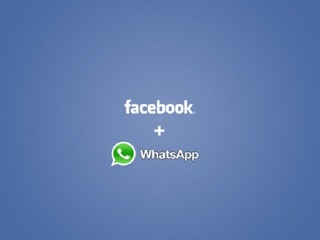
The big news today, of course, is Facebook’s gigantic purchase of mobile messaging app WhatsApp for $16 billion.
Mark Zuckerberg, Facebook’s founder and CEO, got on a joint conference call with Jan Koum, WhatsApp co-founder and CEO, on Wednesday afternoon in order to to discuss the deal, how it came together, what each company brings to the other and how they will work together going forward.
Perhaps the most surprising revelation made on the call was how quickly the deal came together. In all, it took 11 days, or around a week and a half, for Zuckerberg and Koum to agree to merge, which seems like a pretty short amount of time for a deal of this size.
“Jan and I have known each other for a couple of years, and we’ve been talking about different things we could do together and how the world will evolve in terms of communications and social networks,” Zuckerberg said. “And he’s been a valuable thought partner the whole time.”
So, last Sunday, the two started talking and Zuckerberg “proposed that if we joined together that that would help us really connect the rest of the world and could help out with things like Internet.org, by bringing these two communications tools, that are very different, together.”
So Koum thought about it, said he was interested; the two discussed the price, came to terms and the rest is history.
Elsewhere in the call, Zuckerberg tied the deal to buy WhatsApp into the company’s recently announced goal to create a set of stand-alone apps for mobile.
“The combination of WhatsApp and Facebook will allow us to deliver new, and engaging, mobile experiences, connect many more people around the world and achieve our mission of giving people the power to share, and making the world more open and connected,” he said.
Facebook, he noted, has spent the last few years as a mobile-first company.
“As I said in our last earnings call, our goal for Facebook over the next few years is to deliver a set of new mobile products, that allow people to share any type of content with any set of people they want,” said Zuckerberg. “We want to provide the best tools, to share with different sized groups, and in different contexts.”
“WhatsApp fits this vision perfectly.”
The company has doubled in size in the last year; it now sees over 450 million people using it each month, and more than one million new people are signing up every day. In fact, WhatsApp is actually the only widely used app with more engagement, and a higher percentage of daily users, than Facebook!
The service is on track to reach one billion people within a few years and “Internet services that reach a billion people are all incredibly valuable,” Zuckerberg said. The app will help accelerate Facebook’s progress in connecting the entire world to the Internet, as well as complimenting Facebook’s own services.
WhatsApp will be Facebook’s second messaging app. In March 2011, Facebook acquired Beluga, a free and private group messaging service for iPhone and Android devices, for an undisclosed amount. Beluga was eventually transformed into Facebook Messenger, which was launched in August 2011.
Zuckerberg, though, sees no conflict between the two services.
“People use WhatsApp as a replacement for SMS to communicate with their contacts, as well as small groups of people,” he said. “Our communication products, like Facebook Messenger and Chat, are used mostly for chatting with your Facebook friends and often sending messages that aren’t necessarily real-time.”
These are “different but important use cases” he said, and Facebook wants to invest in both.
As for what WhatsApp gets from Facebook, Koum
“Facebook give us a chance to turn WhatsApp into a service that reachs even more people and creates even greater value for our users.”
“Facebook is a social network and it offers many different important functionalities than WhatsApp offers as a communications service, and we’re excited to benefit from the unique expertise knowledge and infrastructure that Mark, and the team, have built out over the last decade.”
As for WhatApp’s future holds, Facebook will be putting its immediate focus on increasing WhatsApp’s reach and engagement, with more emphasis on monetization coming down the line.
In addition, Koum is also going to be joining the Board of Directors at Facebook.

















